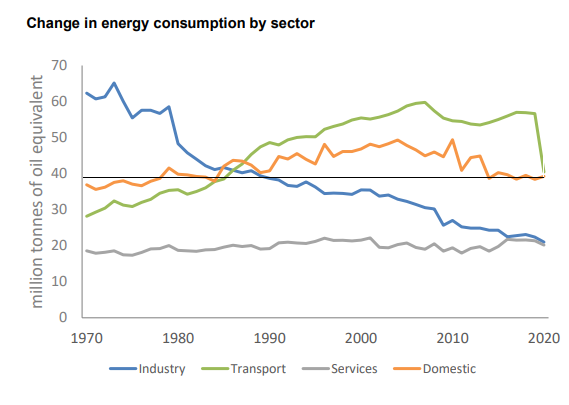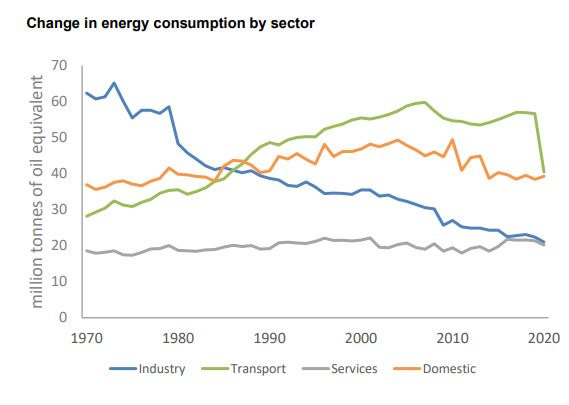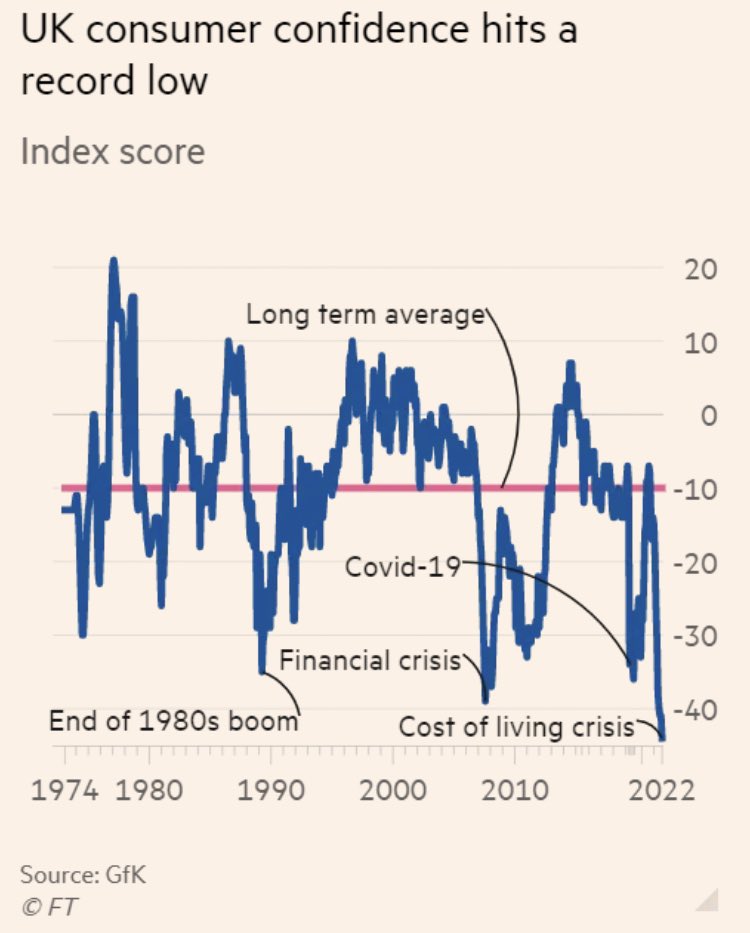

Dorkins
-
Posts
16,517 -
Joined
-
Last visited
Content Type
Profiles
Forums
Events
Posts posted by Dorkins
-
-
6 hours ago, Confusion of VIs said:
You need to read up about Octopus and how it operates. It is a major renewable energy generator. It makes profits on this part which is uses to subsidise its domestic supply business.
It needs to do this because it has to pay the set National Grid price for electricity, which is governed by the price of gas despite all of its customers being on 100% renewable tariffs and it producing more than enough cheap renewable power to meet the needs of its customers.
This is just another example of the hidden subsidies being given to the fossil fuel industry.
If Octopus produces enough renewable power to meet the needs of its customers, where does the electricity Octopus customers are using come from when it's gloomy/dark out and there isn't much wind?
-
1 hour ago, Unmoderated said:
With persistent inflation high enough to case rates to go high enough to cause a crash you'll only get one in real terms.
private sector seems to be getting ... below inflation on average ... pay rises.
Okay, so let's put the pieces together then:
Private sector payrises (i.e. those applying to 80% of the workforce) are below inflation. So let's say Mr X was earning £100 net and spending £80 on non-housing living costs a year ago, now he is earning £105 and spending £90 on non-housing living costs. So instead of having £20 to spend on housing costs he now has £15.
Also, interest rates have already risen. That means the same income stream now services a smaller mortgage principal. So if a year ago mortgage rates were 2%, that £20 could have serviced £1000 of mortgage principal (interest only). And now if mortgage rates are 4%, that £15 can service £375 of mortgage principal.
-
Been a while since we had any bulls saying "house prices won't fall until interest rates rise and I can't see rates going over 2% in the next 5 years/this decade/etc".
-
Presumably there are ways pubs could reduce energy consumption. Switch off the kitchens, crisps and nuts only. Curtain round the door to reduce heat losses from people coming in and out, this seems to work well in cafes in Vienna. Shorter opening hours or open fewer days a week to pack the bodies in, if there are enough people in at the same time their body heat should make a significant contribution to keeping the place warm.
On the financial side, hospitality businesses are going to have to negotiate deep rent cuts if they are to stay in business.
Adapt or die.
-
-
1 hour ago, Bear Goggles said:
Furlough cost £70bn, so they’ve thrown those kinds of sums around recently.
Okay, but even £70bn isn't enough to bail out all households and businesses from rising energy prices which is what the title of the thread seems to be.
-
9 minutes ago, henry the king said:
And if you subsidise it then demand will not go down. So you are basically committing to £250bn a year until Ukraine war ends. Which could be a decade.
Absolutely farcical.
Indeed. And there are only two ways to get demand down, either ration energy use or let prices rise for energy end users so they change their behaviour.
-
4 hours ago, pig said:
They're claiming energy cap to hit £6K next year.
You may as well buy every household in Britain solar panels,
The government is not rich enough to be able to subsidise energy prices back down to where they are now if the market price goes as high as that.
Even just for households to bring annual energy bills down to £2k pa when the market price is £6k pa that would cost the government £4k/property in subsidies x 35 million properties = £160bn. That's a whole extra NHS to pay for and apparently the country can barely afford the one it already has.
Then say they want to subsidise energy costs for businesses too, what would that cost? Another £50-100bn? So maybe we're now up to the government spending £250bn pa to subsidise energy prices out of total public spending of £1tn at present i.e. 25% of all public spending would be going just on energy subsidies.
-
5 hours ago, Insane said:
This is why a lot of older people will not sell their house and move into a retirement flat. If you surround yourself with older people only you will get older yourself faster.
After they retired my parents sold the house where they raised their kids on an identikit 1970s suburban estate and moved to a much nicer house on a fairly bespoke small development surrounded by a river, trees etc. It's a beautiful location but they are surrounded by people in their late 70s and 80s, not a worker in sight as far as I can tell. Their elderly neighbours are popping their clogs one by one and I think it's doing something weird to my parents' brains.
It also doesn't help that my grandparents barely made it to age 70 in most cases, they were typical working class people from their generation who smoked and drank heavily their whole lives and paid the price in terms of life expectancy.
-
1 hour ago, Will! said:
I used to work in General Practice in well to do mid-Sussex. A significant number of my patients were baby boomers who had retired in their fifties, become sedentary and obese, and developed a type of learned incapacity ("I can't walk to the Post Office, it's nearly a mile.") by their late sixties. They were so lacking in stimulation they viewed going to the GP as a recreational activity.
Stay active.
Edit: quoted @Insane, but meant for @hotblack42
This sounds exactly like my retired late 60something parents. They convinced themselves that walking for a couple of minutes from the car park to [destination] is the most they are physically capable of doing despite neither of them having any kind of serious diagnosed medical condition. It's sad that they've decided they are frail elderly people when they really are not, it's a cage they've built for themselves inside their heads.
-
18 minutes ago, PeanutButter said:
You’re forgetting airbnbs and holidays homes.
Disposable income is in the process of being wiped out by inflation, seems like a good time to be getting into the hospitality industry.
-
Just now, winkie said:
Oil is one form of energy, we have North sea gas......used for hot water, heating and cooking, bio, solar etc........sure more coal was used in the 70s... graph not telling the whole story.

That's not just oil usage, that is all forms of energy but converted to tonnes of oil equivalent to make it possible to add them up.
-
Here's one with a horizontal line to aid comparison:

-
33 minutes ago, winkie said:
Do the maths......heating one room rather than a whole house, fewer electrical items, out of house most of the day.
Here you go, UK domestic energy use:

There are about 20% more people in the UK now than there were in the 1970s but total domestic energy use is about the same. Home energy consumption per capita is lower now than it was in the 1970s.
-
6 minutes ago, winkie said:
Not energy usage in the home it wasn't.........
Link?
-
1 hour ago, winkie said:
got more stuff today that requires energy to work when energy is expensive....... didn't need to charge anything then, no front loading washing machines, dishwashers, central heating or even freezers.
Energy use per capita in the UK is lower now than it was in the 1970s.
http://stochastictrend.blogspot.com/2012/10/per-capita-energy-use-in-uk.html
-
Time for these landlords to quit whinging and get selling. Nobody owes them a living.
-
10 hours ago, Flat Bear said:
Just 30% off the FTSE with zero dividends over a prolonged period would see these pools dry up rapidly.
30% off FTSE would be great, some of us are working age people trying to build up their pension pots so the cheaper equities get the more we can buy with our wages.
-
-
33 minutes ago, Mikhail Liebenstein said:
9%, but i expect 12%
Ok, thanks
-
46 minutes ago, Mikhail Liebenstein said:
I have a strong view on this. People need to know what they are actually invested in, in a DC scheme. To many schemes default into rubbish lifestyle options switching out of equities to low risk low reward investment.
I'm expecting to have a £3m pension pot at least in the next 10 years, all via DC schemes. In fact it may be larger. I'll need to lobby for a tax change!!!!
If you don't mind me asking, what CAGR are you assuming?
-
With the current 20-40somethings mostly paying into DC pension pots which might hit £100k at SPA if they're lucky there will not be many ordinary people retiring in their 50s in 15-20 years' time.
With low yields and little economic growth people should really be thinking about DC pension contributions being as big (or bigger) an outgoing as housing is now (i.e. a third of gross wages going in each month) but that will need a big change in attitudes.
-
The UK last built a reservoir 31 years ago apparently.
The neoliberal economic miracle since 1980 seems to have been largely built on eating the seed corn rather than investing for the future.
What has the UK built in the last 40 years? Some skyscrapers in the City to house a bunch of suits buying and selling mortgage derivatives secured on the UK's largely unimpressive housing stock.
-
14 minutes ago, FallingAwake said:
While I agree the government aren't going to pay most of people's electric bills, less than 2 years ago the government was paying 80% of the wages of those people who were furloughed.
In other words, if the government truly believed there was a crisis, it could find both the political will and the money.
The real question is the political will factor, and I don't think it's there... although they might put up the £400 subsidy that is being offered to all households, between October and March.
£400 x 20 million households = £8 billion.
So they've already committed to spending £8 billion to subsidise people's bills. It's not out of the realm of possibility for them to decide to raise that to, say, £16 billion.
The logic with furlough was that if they let unemployment increase by several million then a lot of those people might become long term unemployed and the total economic and public purse cost would be higher than temporarily covering their wages. There is no such 'stitch in time saves nine' logic to the state paying people's gas bills as far as I am aware.
I'm sure the amount of government subsidy for gas+electric bills will go up from what's already been announced but I suspect the second package will be more targeted e.g. pensioners and people on certain benefits only so that their core voters and the poor are looked after. If you are a normal working age household then it will likely be £3k+ pa gas+electric bills for you. People who think the government is going to push a 'stop gas+electric bills going up' button are deluded.

Electric cars will cost more to run than petrol from October
in House prices and the economy
Posted · Edited by Dorkins
There isn't that much actual energy storage though, this is an accounting concept. The real physics answer is that when it's gloomy/dark out and there isn't much wind Octopus customers are using electricity generated by burning fossil fuels. So despite the '100% renewable tariff' greenwashing Octopus customers are just as dependent on the reliability and flexibility of fossil fuels as everybody else who uses the National Grid.
It's good that Octopus are supplying renewables to the National Grid, as the current crisis is showing the more energy sources there are in the mix the better, but the idea that Octopus customers should enjoy the reliability that fossil fuels supply to the National Grid without paying for it via National Grid pricing rules is a bit rich.
Longer term I think it's true that many/most households will have their own battery storage at home and operate on agile tariffs where they really would be paying for the energy supplied to the grid by their energy provider because they would be able to buffer it themselves at the household level.